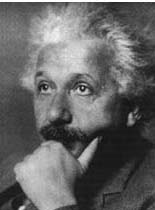

Research
In 1905 Einstein published five revolutionary papers in the scientific magazine "Annalen der Physik". In April of that same year, Einstein submitted his doctorial thesis, "A New Determination of Molecular Dimensions". Some of the other papers that he published include his famous article "On A Heuristic Point of View Concerning the Production and Transformation of Light" in which Einstein described the electromagnetic radiations of light by using Max Planck's quantum hypothesis. Einstein states that "in order for an electron to be removed from the cathode, a given quantity of energy had to be delivered to the atom". This revolutionary publication won him the Nobel Prize in 1921.
Another one of his papers was "On the Electrodynamics of Moving Bodies" in which Einstein reveals special relativity. In his paper he describes a stationary clock and a clock in motion:
"If at the points A and B of K there are stationary clocks which, viewed in the stationary system, are synchronous; and if the clock at A is moved with the velocity v along the line AB to B, then on its arrival at B the two clocks no longer synchronize, but the clock moved from A to B lags behind the other which has remained at B by (up to magnitudes of fourth and higher order), t being the time occupied in the journey from A to B."
-Albert Einstein "On the Electrodynamics of Moving Bodies"
After publishing "On the Electrodynamics of Moving Bodies" Einstein published "Does the Inertia of a Body Depend upon its Energy Content?" where he derived the equation E=mc2 which stated the relationship between mass and energy. In 1906 Einstein published "Planck's Theory of Radiation and the Theory of Specific Heat" which is, considered by most, the first publication of solid state quantum theory.
 |
Einstein's accomplishments astonished many scientists and mathematicians of his day, notably Max Planck and Walther Nernst of Berlin took special interest in Einstein. Planck and Nernst offered Einstein a professional job at the university be a member of the Prussian Academy of Sciences, and be head of the Kaiser-Wilhelm-Institut of Physics. This offer was very tempting to a patent clerk. In Berlin Einstien worked on generalizing his Special Theory of Relativity. After seven years he published "The Foundation of the General Theory of Relativity", which did not get wide recognition until the thoery was witnessed by an English astronomer Arthur Stanley Eddington on May 29. Einstein's research in physics has lead to many advancements in technology, some of which have changed the world forever. Specifically his research on General Theory of Relativity is one of the most significant contributions to physics since the Newton . |